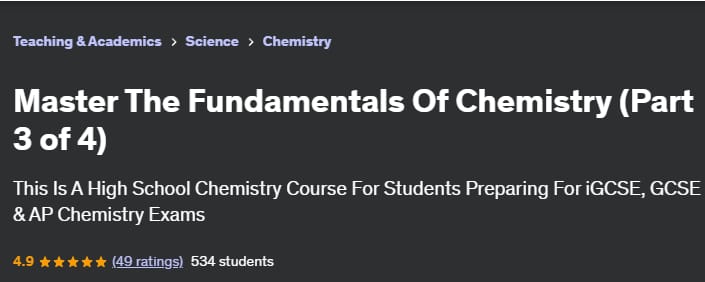Description
Master The Fundamentals Of Chemistry (Part 3 of 4), the course for teaching the principles of chemistry part 3 has been published by Udemy Academy. This course gives them the skills to feel confident for their exams. Help your student prepare for their exams by helping them understand chemistry with this course, rather than focusing on trying to memorize seemingly unrelated material. This course covers all the material studied in the iGCSE Chemistry and GCSE Chemistry courses in the topics of acids, bases and salts, reactions of metals, identification of substances and energies. These are usually the subjects covered in (i) GCSE courses by schools in Years 10+11 (Year 9/10, ages 14/15/16); This material is also relevant for most GCSE courses. It is designed for students who are currently in Years 10/11 (Year 9/10, ages 14-16) and are reviewing material covered in their school lessons.
It will also be useful for those students entering A Level Chemistry or IBDP courses who need a solid foundation before embarking on these more advanced qualifications. The material discussed in this topic is also covered in most American and Canadian 10th grade chemistry/science curricula (ages 15/16). This IGCSE (O Level) Chemistry class is offered by IGCSEprep on Udemy. This masterclass covers all the content needed to write the IGCSE Chemistry exams offered by Pearson Edexcel (double or triple) or Cambridge CIE (core or advanced) or other exam boards such as Oxford AQA.
What you will learn
- In this course, students learn exactly what they need to know for their chemistry exams so that they can pass the exams in the best way possible.
- Understand that metals can be placed in a reaction series based on their reactivity with water or dilute acids.
- Understanding how to place metals in order of reactivity based on displacement reactions with metal oxides and aqueous solutions of salts
- Know the reactivity order of common metals
- Know the conditions of iron rust
- Learn how to prevent iron from rusting
- Explain the use of litmus, methyl orange and phenolphthalein to distinguish between acids, bases and neutral solutions.
- Understand how using the pH scale identifies a substance as a strong/weak acid/base
- Describe the use of a universal indicator to determine the pH of a solution
- Know that acids produce +H ions in solution while bases produce -OH ions.
- Know that bases can neutralize acids
- Learn how to perform an acid/base titration
Who is this course suitable for?
- iGCSE and GCSE students studying double (core) or triple (extended) chemistry or courses for a similar age range.
Master The Fundamentals Of Chemistry course details (Part 3 of 4)
Chapters of Master The Fundamentals Of Chemistry (Part 3 of 4)
Course prerequisites
- Parents of students currently studying Chemistry at GCSE level or similar courses for the same age range
Pictures

Sample video
Installation guide
After Extract, view with your favorite Player.
English subtitle
Quality: 720p
download link
File(s) password: www.downloadly.ir
Size
4.49 GB